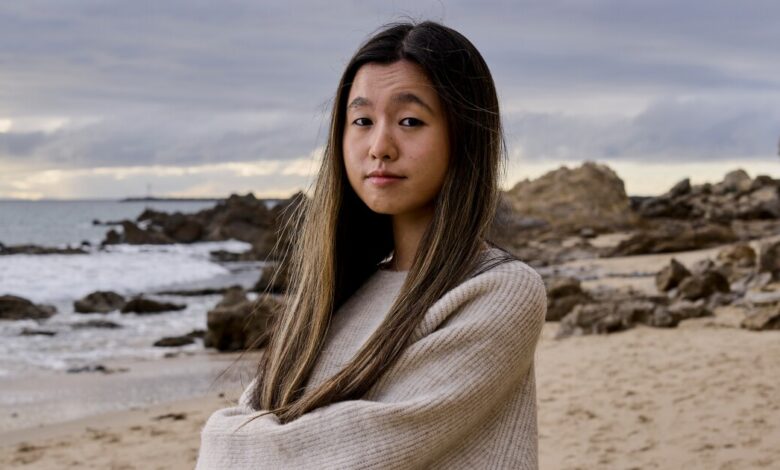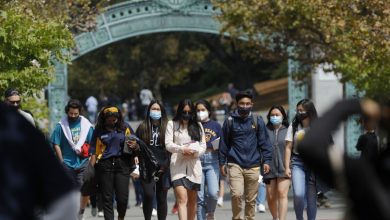By Announcing an Investigation, Did Tulane Censor Her?

[ad_1]
A few days after the article was published, Erica Woodley, Tulane’s associate vice president and dean of students, student resources, and support services, sent a campuswide email that denounced Ma’s article, pointed traumatized students to a phone line for emotional support, restated the university’s free-speech policy, and said the university would review student complaints.
“Tulane strongly condemns antisemitism, anti-Blackness, and all forms of bias and discrimination. The Office of Student Conduct is reviewing this matter,” wrote Woodley. “We acknowledge the pain these words have caused.”
That email has landed Tulane in the crosshairs of a roiling debate over campus free speech.
Free-speech activists said administrators effectively violated their own free-speech policy and created a censorious environment by hinting to the campus community that Ma might have violated a university policy. The investigation, according to a letter from the Foundation for Individual Rights and Expression, should have been both brief and entirely private.
“This seemed to be more of a public-relations move than actually caring about the complaints that are submitted to them,” Sabrina Conza, a program officer for campus rights advocacy at FIRE, said. “The university should be able to read the article and say, ‘OK, this is protected under our free-speech promises.’ And that’s it. There doesn’t need to be an intensive investigation.”
But some students and civil-rights activists said that when a student or professor’s speech is offensive, the university has an obligation to publicly address the issue and take transparent, public action. Silence and inaction, they said, can make the situation worse and leave those targeted feeling alone and unsafe.
Across the country in recent months, college administrators have been under increasing fire over whether or not they acknowledge, denounce, or publicly investigate hate speech.
Most of the time, hate speech is free speech. It’s not a hate crime, but there is significant harm that’s been done to our community.
Last October, “White Lives Matter” flyers papered the University of Missouri at Columbia campus. One of the flyers said “we must secure the existence of our people and a future for white children.” The university issued no public statements and, when asked by local media, said they couldn’t take them down, angering students.
Last December, also at the University of Missouri, after a monthlong investigation into a student’s racist Snapchat message, Mun Y. Choi, the institution’s president, announced that the student’s behavior did not constitute harassment as the message was sent only to one friend, at whom it wasn’t aimed, and was therefore protected by the First Amendment. The snap, which contained the N-word and seemed to advocate violence against Black people, garnered wide-scale student outrage but violated no policies.
And just ahead of International Holocaust Remembrance Day in January, when someone wrote in chalk #YeIsRight at the University of Alabama, the administration sent out a message saying, “We condemn these chalkings, which violate our Capstone Creed, our campus culture and our core values.”
The #YeIsRight slogan, which refers to Kanye West’s official name change to Ye in 2021, has been adopted by white supremacists to spread a number of antisemitic conspiracy theories, including Holocaust denial. The University of Alabama announced an investigation. FIRE took umbrage.
The University of Alabama “may criticize the messages, but it must comply with its First Amendment obligations, including by allowing subjectively offensive expression, so long as it does not violate reasonable time, place, and manner restrictions,” Conza wrote in a letter to the university.
The dispute at Tulane, which played out over the last month, is a stark example of the delicate balance administrators must strike between protecting the principle of free speech and being responsive to demands that universities speak out when students are offended or feeling threatened.
After dropping out of her sorority and resigning from the Women in Politics club, Ma took a leave of absence from the university. Now she’s not sure if she’ll return at all. She insists that her detractors have misread her article and that nothing in it constitutes hate speech.
“The only thing I did wrong was overestimating the intelligence of most of the Tulane population,” Ma said in a statement to College Dissident, the website where her original article appeared.
What should universities do about an article like Sarah Ma’s amid growing antisemitic beliefs and incidents across the nation?
Ma, a junior majoring in philosophy and finance with a minor in political science, said she mostly kept her political opinions to herself on campus, and she didn’t expect anyone at Tulane to find or read her piece.
The article, titled “Ye Did Nothing Wrong,” focused on four of Ye’s incendiary comments and actions: the “White Lives Matter” shirt he wore to Paris Fashion Week; his threat to go “death con 3” on Jewish people; his quote, “I love Hitler”; and his posting a picture of a swastika inside the Star of David.
“The public has deemed Ye Black Hitler, silencing all context and explanation for his statements,” Ma wrote in her piece.
In defense of the “White Lives Matter” slogan, which has been identified by the Anti-Defamation League as hate speech whose origins trace to white supremacist movements, Ma argued that taking issue with the statement is itself racist.
“Assuming Ye is saying Black lives do not matter just because he promotes the phrase ‘Whites Lives Matter’ [sic] seems to follow the reasoning that there is one superior race,” Ma wrote. She goes on to say that Black people have had the same legal rights as white people since the 1960s, so the premise behind the Black Lives Matter movement, which is largely centered around police brutality against Black people, is flawed.
To justify the tweet that got Ye banned from Twitter, Ma wrote, “For the most part, Jewish people run Hollywood. That’s a fact.” She then lists examples of Jewish people Ye has claimed harmed him (including a psychiatrist who diagnosed him with bipolar disorder).
“Simply put, most of the people who have wronged Ye are Jewish,” Ma wrote in her essay. “Ye is not any bit guiltier than the people trying to cancel him.”
An investigation into speech should be linked to “a clear policy.”
Like many private liberal-arts colleges, Tulane has a free-speech policy that protects all speech so long as it doesn’t threaten a particular person or group or create a “hostile environment” that could interfere with other students’ ability to get an education or participate in university activities, among other things.
A spokesperson for Tulane said the university could not provide details about the case due to federal privacy laws, but that all complaints that come into Tulane’s Office of Student Conduct are being reviewed.
In the weeks following the publication of Ma’s essay, opinion columns published in Tulane’s student paper, The Hullabaloo, argued that Ma’s article constituted a direct threat and created a hostile environment for Jewish students.
Parts of Ma’s article “belittle Jewish and marginalized communities and they perpetuate hatred that endangers the lives of marginalized individuals,” Taylor Spill, a Tulane junior, wrote in her piece for The Hullabaloo. “Tulane should treat the article and the author in the way that they treat other threats to the community.”
For Conza, the program officer at FIRE, freedom of speech does not mean freedom from consequences. The same principle that allows Ma to publish her article also allows the university to repudiate it and her classmates to argue against it as long as they aren’t threatening violence or harassment.
But Tulane’s announcement, she said, constituted a “chilling effect” by implying that the article may have violated a rule, a stance which could deter future speech, especially Ma’s. Universities have an obligation to investigate all complaints to the student-conduct office, Conza said, but not to turn it into a public affair.
Conza wrote a letter to Tulane saying that by announcing an investigation into Ma’s article, the university was violating its own free-speech policy “even if Ma’s article was objectively offensive and discriminatory on the basis of a protected status.”
“We are completely fine with universities doing a review of the information and allegations when there’s a complaint submitted,” Conza told The Chronicle. “They should have kept it within the office that they were investigating this, and they shouldn’t have announced it to everyone and announced to Sarah that they were investigating.”
Conza said that, based on her reading of Ma’s article, it doesn’t reach the bar for a hostile environment.
“It has to be persistent. It has to be severe and pervasive,” Conza said. “That means it can’t just be one instance of expression, and that’s backed up by Tulane’s own policies.”
Jonathan Friedman, director of free expression and education programs at PEN America, a free-speech-advocacy group, agreed that public investigations of every complaint against a student or faculty member’s speech could have an overall chilling effect on a campus. An investigation into speech should be linked to “a clear policy,” Friedman said, whether that be a student-conduct policy or a faculty responsibility.
“A lot of the time what we’re seeing is these quote-unquote investigations launched in response to situations where there isn’t actually a clear violation of anything,” Friedman said. “In the current media environment, there is such a public clamor for information, more demand for immediate punishment, that the university needs to take the opportunity to clarify what its existing policies are.”
University offices receive complaints and consider them seriously, but the answer isn’t always a full-blown investigation, Friedman said. Sometimes, universities should just offer student support and counseling and the opportunity to speak with administrators more about their policies, according to Friedman.
And they need to decide on guidelines for hate-speech investigations far in advance — when should it remain discreet and when can it be publicly announced.
“It shouldn’t be ambiguous to faculty or to students how this is going to work and where the university has drawn these lines and how these policies and offices and processes are going to go,” Friedman said.
Martha Compton, director of strategic partnerships and client relations at Grand River Solutions, a higher-ed consulting firm, specializes in student-conduct and Title IX investigations. Investigations into a student’s conduct can extend beyond a single instance of speech, and because of federal privacy laws, onlookers can’t always know exactly what has been brought to the university’s attention in any particular case, Compton said.
“The beauty and the challenge of an investigation is you don’t know where it’s going to lead until you do it,” Compton said. “Sometimes the question is a little bit larger. Is this a pattern of behavior from an individual that might constitute a hostile environment to someone else based upon their identity or membership in a protected class?”
In the case of a very public situation, it is reasonable, and sometimes almost obligatory, for universities to respond to and reassure their communities that they are looking into conduct, Compton said.
“They’re not saying what happened, what didn’t happen,” she said. “They’re not making a determination. They’re simply stating that their policies and procedures are being followed, which I think would be the reassurance that everyone in the public wants — from the people who were upset to the person who was accused. If I was that person, I would want to know that their policies were being followed.”
Compton also noted that even in the face of relatively mild promises to “review” a situation, those worried about censorship and attacks on free speech may view the institutional response as a part of the public outcry when the college is merely following up on their obligations to provide a safe environment for students.
“Most of the time, hate speech is free speech,” said Elissa Buxbaum, the ADL’s national director of college and university programs. “It’s not a hate crime, but there is significant harm that’s been done to our community. So let’s pay attention to how the Jewish community is experiencing this, how our entire community is experiencing this.”
Universities should use the opportunity to review incidents of hate speech as an opportunity to double down on diversity, equity, and inclusion programs, Buxbaum said. And reviews of the incident can provide insights on how the university can avoid future harmful incidents while letting students and the campus community know that “things aren’t being swept under the rug.”
“For people to feel like nobody cares — that’s the worst thing,” Buxbaum said. “A response to an incident can make the community feel like we care about you, care about our community.”
At around 11:30 p.m. on the day the article was published, Ma said her sorority’s president called her. She asked Ma to remove references to the sorority from her College Dissident profile and delete pictures of the sorority house from her Instagram. That was how Ma found out her article was being widely shared and discussed on campus.
A couple days after the article went live, Woodley, the Tulane dean, reached out to Ma directly, and they spoke over Zoom, Ma said. Over the course of several conversations, Woodley told Ma her housemates had been in touch with Woodley’s office and that Ma should probably leave her current off-campus housing. Woodley offered Ma a security detail on campus, and walked her through the process of filing harassment complaints or reporting threats, according to Ma.
Outraged comments quickly flooded Instagram and the popular anonymous-messaging app Fizz. The campus’ main Jewish student centers, Tulane Hillel and Chabad, rebuked the article and organized a support circle on antisemitism a week later.
Antisemitism is rising across the country. According to the Anti-Defamation League, there were 2,717 antisemitic incidents in 2021, making it the worst year on record for documented reports of harassment, vandalism, and violence directed against Jews in the U.S. since the organization first began tracking it in 1979. Twenty percent of Americans believe at least six or more anti-Jewish tropes, the highest level measured in decades, and 85 percent of Americans believe at least one trope, a 2022 ADL survey of over 4,000 people found.
“We’re focused on supporting Jewish students who were impacted by seeing a member of the community express their support for these deeply disturbing antisemitic and racist beliefs,” said Ron Gubitz, executive director of Tulane Hillel.
Both of the clubs Ma was affiliated with issued statements condemning her article and distancing themselves from her. Several of Ma’s sorority sisters, some of whom are Jewish, posted on Instagram how hurt they were, and students who had been in her classes posted about their shock and dismay. “We found the posted article to be harmful and disheartening and affected many of our own members,” the sorority said in a statement.
For people to feel like nobody cares — that’s the worst thing. A response to an incident can make the community feel like we care.
Ma said she received threats from other students and provided a few examples that she had also reported to the university. One read that Ma deserves “to die in a fire” and that she would “get bullied out of tulane if ur not smart enough to leave on ur own.” In an online poll, one anonymous user asked, “Does the article girl deserve to be punched for what she wrote?” Out of 900 responses, about 500 users responded “Yes.” Another 170 responded “more than punched.” A student emailed a screenshot of the poll to Woodley, saying they were concerned for Ma’s safety.
Ma said that out of her college friend group, only a small handful continue to speak with her. Tulane has one of the highest percentages of Jewish students at a nonsectarian university, according to Hillel International. It was the first Southern university to admit Jewish people, and some estimates place the Jewish population at roughly 40 percent of the student body.
“A lot of my really good friends are Jewish,” Ma told The Chronicle. “I was kind of shocked at them not even reaching out or giving me a chance or even asking me if this was, like, my point of view. And they just completely just blocked me, and then I saw them post a bunch of responses.”
Since withdrawing for the semester, Ma has been living at her parents’ house. She initially said she intends to return to Tulane in the fall, picking up where she left off for her senior year, but now she’s started applying to other schools for a transfer. As for her infamous essay, Ma has no regrets, except maybe the title, which she said reads a little like click-bait.
“ If I were to do it again, I would publish the same article.”
[ad_2]
Source link






